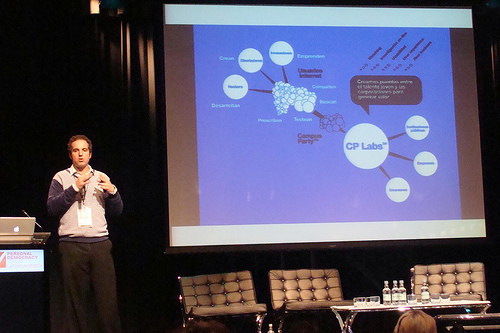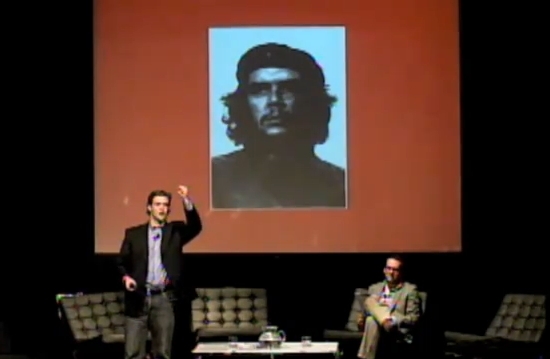
Personal Democracy Forum. Photo by Luis Carlos Díaz, under a Creative Commons Attribution-NonCommercial 2.0 Generic licence.
The Latin American Personal Democracy Forum took place on the 18th and 19th of November in Santiago Chile. On one hand lecturers and conference speakers with expertise in areas of technology applied to the media and democracy, among other subjects, gathered together, and on the other hand an audience primarily composed of technologists and people from civil organisations united, all eager to learn about the different experiences offered in the forum.
They were two rather lively days (you can see two posts summarising each day here [es] and here [es], or consult the live coverage [es] of the second day by Luis Carlos) in which, apart from the shows planned by the organisers of the event, there was cheering and booing, complaints and congratulations, but above all, a motivational atmosphere ripe for debate and an exchange of ideas, something which was also one of the goals of the event, as Natalia Fidel expressed from the official PDF website [es] describing the inaugural session on the first day of the forum:
Los organizadores del evento Diego Beas y Felipe Heusser dialogan con los fundadores del Personal Democracy Forum, Andrew Rasiej y Micah Sifry, quienes destacaron la necesidad de traer esta conversación a America Latina, con el objetivo último de construir y organizar comunidades. El anfitrión Felipe Heusser los alerta de las particularidades del contexto latinoamericano, pero esto parece no afectar a los fundadores quienes ya vivieron la transformación de la conversación producida en Estados Unidos en torno a las campañas políticas
Christopher Torres from the Chilean group blog Política Rock, attended the PDF and has a similar interpretation [es] of the theme of politics:
Una de las ideas fuerza que rondó el ambiente en los dos días que duró el encuentro es que la política ya no es una interacción entre un emisor activo (político) y un receptor pasivo (votante), sino que ahora es entre emisores y receptores activos, donde la gente opta por interpelar a sus representantes a través de variadas instancias, ya sea en una reunión, la feria, un puerta a puerta o en la cuenta de Facebook o Twitter del político en cuestión.
However, Rafael Uzcategui, a Venezuelan activist who also attended the event, expressed certain interesting discrepancies [es] on the topic:
Las palabras de bienvenida … colaron, de entrada, que lo que se venía a conversar era más sobre “tecnología” que sobre “política”. Bastante extraño para un evento cuya consigna, precisamente, era sobre cómo la tecnología estaba transformando la política.
Rafael also filmed the talk that David Sasaki gave, entitled “Intimately Linked: the expansion of technology and human rights” and shared the video on his blog [es]. But later he also tells us about what seemed to him to be the best meeting of the day:
Despues del almuerzo –dos sanduchitos de pan de baquete, gasesosa y manzana- participé en uno de los cuatro paneles: “Cómo puede ayudar la tecnología a construir movimientos de base en sociedades desiguales”, una excelente elección. Deanna Zandt, una activista norteamericana muy clara y estimulante, Roberto Lovato de la campaña contra CNN y Lou Dubbs, así como Pepe Huerta de la propuesta chilena por la neutralidad de la red. Cortos, directos y motivantes. Espacio para la interacción con el público.
The next day there were also several interesting things, like the long presentation by former Chilean president Ricardo Lagos, about which Peruvian blogger Alberto de Belaunde posted [es]:
de las exposiciones que más me gustó fue la del ex presidente chileno Ricardo Lagos. Su interés por los temas de nuevas tecnologías no es una novedad, los invito a revisar su discurso de asunción del mando el año 2000 donde habla de la necesidad de invertir en estos temas.
A talk which had generated much expectation was that of Claire Williams Díaz from Twitter, but as it was just about to go ahead, the presentation that she had prepared failed, as she herself explains in her blog. She sorted it out anyway, although many were still somewhat disappointed.
Undoubtedly the most controversial talk of the entire event was the eagerly awaited speech [es] by Alec Ross, from the US Department of State, especially when he said: “The Che Guevara of the XXI century is the internet”. Diego Beas, editor of PDF gives his interpretation:
Una provocación por parte del cerebro detrás de las nuevas iniciativas diplomáticas del Departamento de Estado no exenta de controversia. … Si el acceso (a la red) se garantiza, la ciudadanía se alfabetiza y una buen parte de las luchas políticas se trasladan a las trincheras digitales, la innovación y el cambio —la revolución, diría Ross; yo sería más cauto— se gestarán en la propia red. … En síntesis, lo que Ross quería decir es que si la participación cívica digital lograra alcanzar un nivel alto y la apertura se ensanchara, el cambio social necesitaría cada vez menos de la figura carismática y unipersonal para provocarlo y cada vez más la del colectivo. … ¿Algo de wishful thinking made in USA? Sin duda, pero también contiene una buena dosis de creatividad al imaginar los modelos políticos del futuro y cómo están siendo transformados por tecnologías que permiten formas de participación que hasta hace muy poco resultaban inimaginables.
A little more critically, the journalist Marc Cooper expressed that the mention seemed interesting to him but that it demonstrated little tact:
How much do you have to know, or not to know, about the region to not understand that an American using the example of Che, in any way or manner, is attaching himself to a political third rail? Ross found that out as he immediately drew fire from both the right and left attending the conference. Some Cuban dissidents were audibly horrified that Guevara should be framed as some sort of implied democratic figure, even if Ross was saying that the Web offered a more open democratic channel. … Many on the left present at the conference were equally angered. With what moral authority does a U.S. diplomatic representative raise the example of Che Guevara in any fashion given that it was, quite literally, a CIA-led squad that hunted down and shot Guevara in cold blood — after he was captured and in custody. And exactly what sort of charismatic, or more to the point, strong-armed, individuals has the U.S. supported in these parts not so many years ago? ) The name Augusto Pinochet sort of pops into mind.
The video of Ross’s talk can been seen here [es]; the mention of Che is at approximately 6:06 minutes. From 24:20 minutes, questions from the public can be heard, firstly one regarding Wikileaks (before the latest leak), then at 27 minutes, one related to Che Guevara asked by a Cuban exile, Ernesto Hernandez Busto, which caused a backlash from some of those present.
The blog La pupila insomne [The insomniac pupil] by Cuban Iroel Sanchez Espinosa, has plenty of criticism [es] of the PDF in general:
A pesar de efectuarse el Forum en Chile y de la proclamada intención norteamericana de “ayudar a grupos de la sociedad civil de todo el mundo”, no hubo una sola palabra en el evento para los mapuches chilenos que protagonizan una larga lucha por sus derechos, ni tampoco para los mineros de ese país que luego del festín mediático de su rescate siguen denunciando las oprobiosas condiciones de explotación a que son sometidos. Al parecer, ellos no caben en el concepto de sociedad civil que promueve el PDF.
Stephanie Falla, editor of Maestros del Web [Web Masters], posts her impressions of the event in three different sections: the positive of the event, the lesson that we take with us and suggestions to improve future programs. Here I show you an example of each section:
(Lo bueno) Proyectos: la combinación de conferencias temáticas y proyectos tangibles con resultados, procesos y herramientas utilizadas ayudó a tener referencias de cómo se han resuelto temas específicos en cada país como para implementarlo.
(Aprendizaje) Soluciones a problemáticas en común: nos dimos cuenta que los problemas sociales en nuestro país en realidad son comunes en la región. Esto nos hace ver que la iniciativa de algunos proyectos que han tenido éxito en un país puede implementar a cualquier otro de la región.
(Propuesta) Conexión: como es típico en los eventos que involucran el internet la conexión es fundamental, en el evento falló en múltiples ocasiones incluso para los expositores, tomar en cuenta que este detalle es escencial para que existan conversaciones y retroalimentación.
(The Positive) Projects: the combination of thematic lectures, projects with tangible results and the procedures and the tools used, helped to show how specific issues have been resolved in each country, like how to implement the solution.
(Learning) Solutions to common problems: we realised that the social problems in our country are in reality common to the region. This makes us see that the initiative of some of the projects that have been successful in one country can be implemented in any other in the region.
(Proposal) Connection: As is typical at events that involve the internet, the connection is fundamental, at the event it failed on multiple occasions even for the speakers; take into account that this detail is essential for the existence of conversations and feedback.
And the Venezuelan Héctor Izarra from Ethosgeek provided us with two posts where he too shares what he learnt at the PDF: “9 keys to how technology can help to build grassroots movements in unequal societies” [es] and “Technological tools helping social and political change.” [es]
Finally, Juan Fernando Giraldo from inventio•lab also posted [es] the lessons learnt at the event, among which appears “Social and political transformation is not for the lazy”:
Una conclusión a la que llegaron casi todos los expositores fue la paradoja de la participación en las redes sociales. Lo que la hace más viable y le da el potencial de masiva, es lo mismo que le da su carácter volátil y en ocasiones vacío: la ausencia de fricción. Entre menos energía tenga yo que dedicar a una causa o iniciativa, es más fácil hacerme parte de ella, pero si esa energía no pasa a las calles, si no se enfrenta al mundo real, si no pasa a generar fricción, no genera chispa. Si la emoción no llama a la acción, no habrá transformación.








2 comments